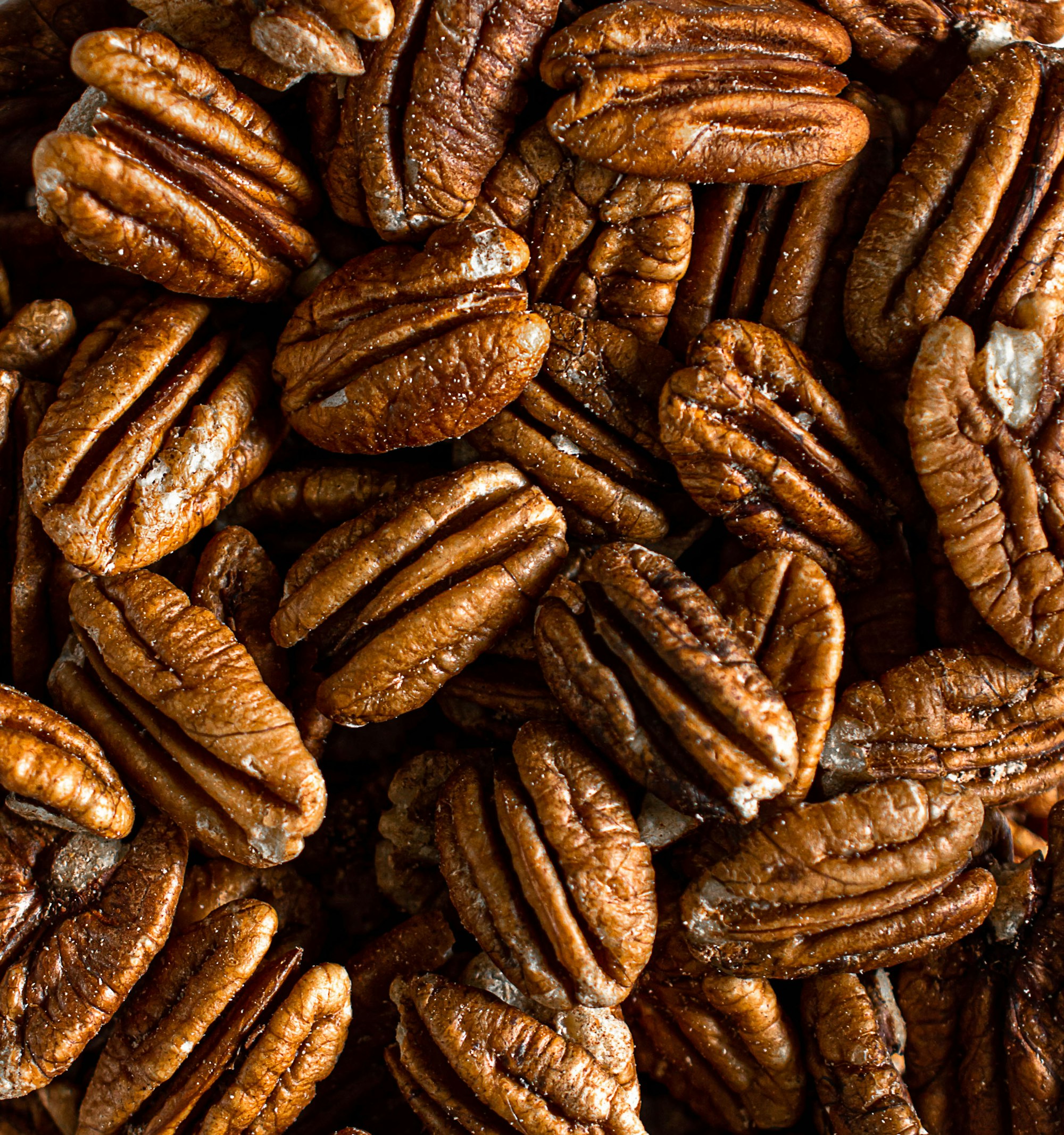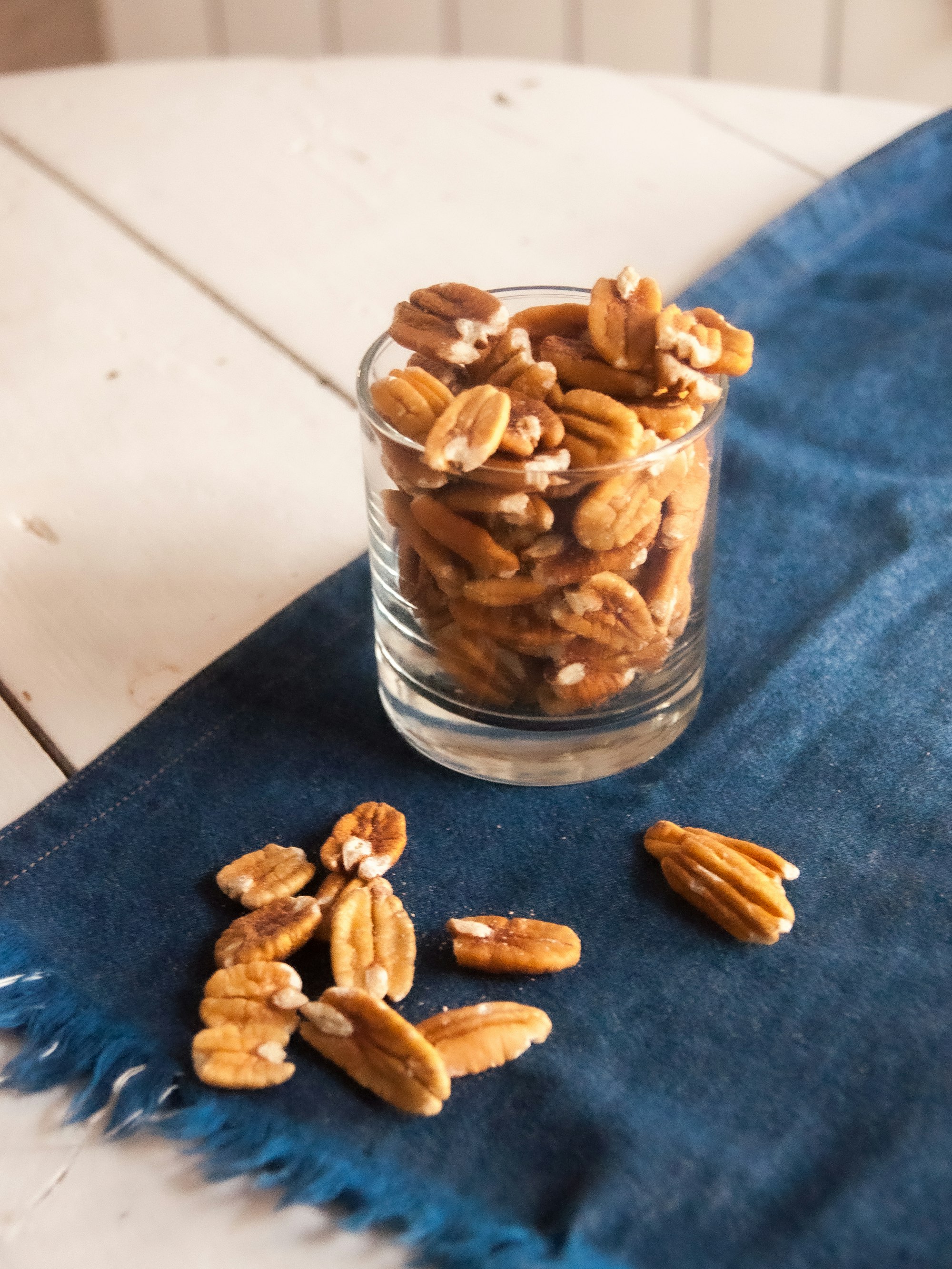We are all guilty of it at some point. We are enjoying our favorite snack while our dog eagerly waits for a bite at our feet. We sometimes give our dog a few pecans while we are eating. Macadamia nuts are toxic to pets. Can dogs eat pecans? Are pecans safe for dogs? Just because we can eat something doesn't mean our pets can.
Can Dogs Eat Pecans?
The short answer is that it’s probably best that you don’t feed your pup pecans. With so many treats available on the market, it seems that giving your pup pecans isn’t necessary. Nonetheless, we understand wanting to share a treat with your best friend. To fully address the question, we have to delve into whether these nuts are safe for your dog to eat. Then, we have to consider whether there is any nutritional value in doing so.

The Safety of Pecans
One point about the safety of pecans probably applies to any nut, bowel obstruction. Many dogs gobble their food, without chewing it before swallowing it. That’s a problem if your pup eats a lot of nuts. That’s saying nothing about the undigestible shells and what they can do to your pup’s GI tract.
Obstructions are medical emergencies that can have life-threatening consequences if not treated early. You’d think that the way around that risk would be to break up the pecans. But is that sufficient to make them safe?
Unfortunately, other issues are on the table, too. Pecan trees contain a chemical compound called juglone. It is the substance that black walnut trees leech into the soil, which can kill sensitive plants growing around them. It is highly poisonous to horses and can cause laminitis or lameness in horses. It is also toxic to dogs, with an acute dose of 10 mg/kg of body weight.
Symptoms of toxicity include gastrointestinal distress, nausea, and vomiting. Of course, your pup would have to eat a lot of pecans to cause an issue. Nevertheless, it does raise a red flag to the safety of feeding your dog pecans.

Another concern rests with mold. Ingesting moldy pecan can cause tremorgenic mycotoxicosis. The onset of symptoms is usually within a couple of hours of ingestion. Symptoms include tachycardia or a rapid heartbeat, seizures, tremors, and vomiting. Even if caught and diagnosed early, the tremors may persist for several days afterward. These facts make a strong case against raw pecans.
The Nutritional Value of Pecans
Now, let’s consider if there is any nutritional value to warrant giving your dog pecans. The nuts are an excellent source of many vitamins and minerals, including magnesium, potassium, and vitamin A. For humans, pecans can offer a healthy addition to your diet when eaten in moderation. However, it’s a different story with dogs.
A 100-gram serving of these nuts contains 9.17 grams of protein, 13.9 grams of carbohydrates, and 72 grams of fat. The recommended amount of protein for an adult dog is between 20–25 grams. Pecans fall in line with that nutrient. There aren’t specific guidelines for carbohydrates. We’ll move on to the elephant in the room.

The Fat Content
The recommended fat allowance for adult dogs is 13.8 grams, with a maximum of 82.5 grams. As you can see, even this small serving pushes the bounds of any nutritional value for your pet. It can also put your pup at risk of obesity if it’s a regular treat. The richness of this food can cause nausea, vomiting, and GI distress. The dietary issues don’t stop there.
That 100-gram serving contains a whopping 691 calories. That’s a lot, even for people. The recommended calorie intake for dogs varies considerably from humans. A 50-pound pup should only get 700–900 calories a day. Eating too many pecans will put your pet over that amount quickly.
The other concern is the long-term effects of feeding your pet pecans. A diet high in saturated fats can increase your dog’s chances of developing pancreatitis. This inflammatory condition can come on suddenly in its acute form or develop as a chronic illness over time. Some breeds, such as Dachshunds, Yorkshire Terriers, and Miniature Schnauzers, are more susceptible than others.

The disease essentially causes the pancreas to attack itself. While the symptoms vary, depending on the form, both include abdominal pain, weight loss, and lethargy. Dogs can recover from mild cases. However, the prognosis for severe and chronic pancreatitis is guarded at best, with additional risks of complications that can impact your dog’s quality of life.
Sodium Content
We also have to consider the sodium content of dry-roasted, salted pecans. The recommended allowance for adult dogs is 75–200 grams. That 100-gram serving contains 383 mg. On that score, the pecans aren’t problematic. Most commercial dog foods have a minimum of 0.3 percent, anyway. However, it can be an issue for pets with heart, liver, or kidney disease.

Accidental Ingestion
If you suspect your dog has eaten pecans, a wait-and-see approach is best. If the food doesn’t agree with your pup, you’ll notice symptoms within a few hours.
Fortunately, tree nut allergies are rare in dogs, unlike people. Your pup is more likely to have issues on this front with animal proteins, such as beef, instead of nuts.
Final Thoughts
The jury probably wasn’t out long before the verdict against feeding your dog pecans came to light. The risk of a bowel obstruction, along with the potential toxins are enough to make a strong case of not offering your pet this treat. While they contain a rich source of protein, pecans also have a high saturated fat content, which can increase the risk of obesity and pancreatitis.
It’s probably not a major concern if your dog eats the occasional pecan that falls to the floor, as long as it isn’t moldy. Nevertheless, we recommend not feeding your dog pecans or any other nuts, save peanut or almond butter. If in doubt, consult your veterinarian.





